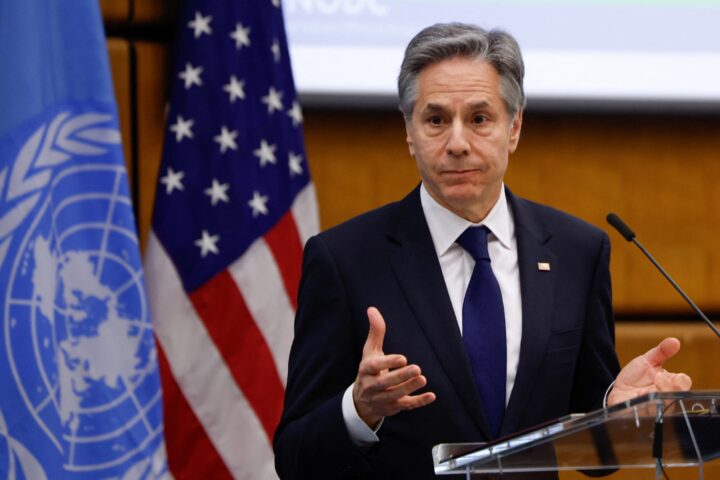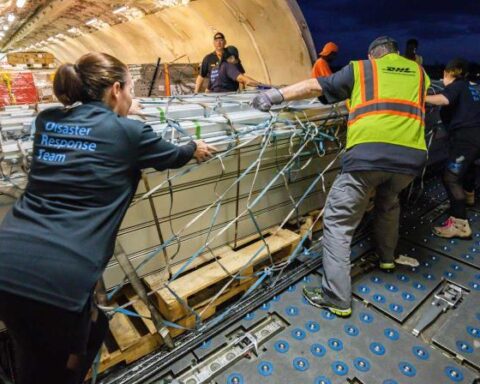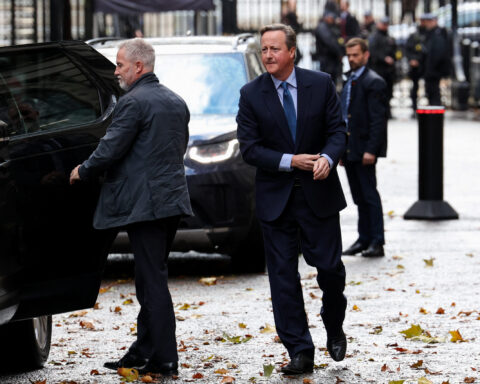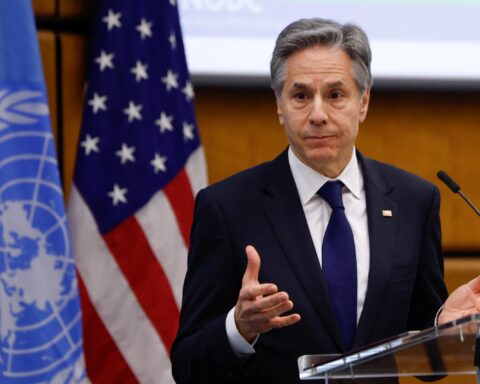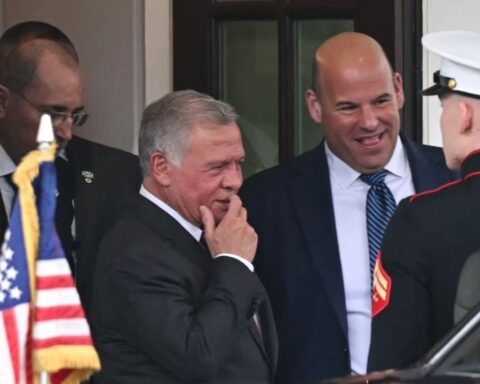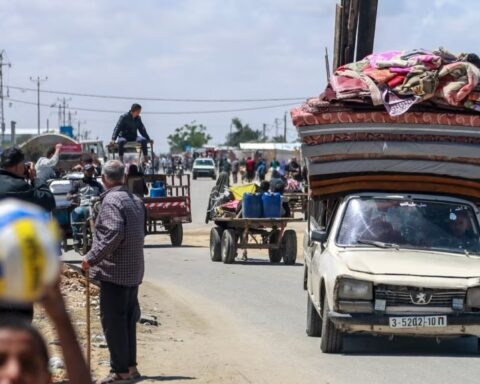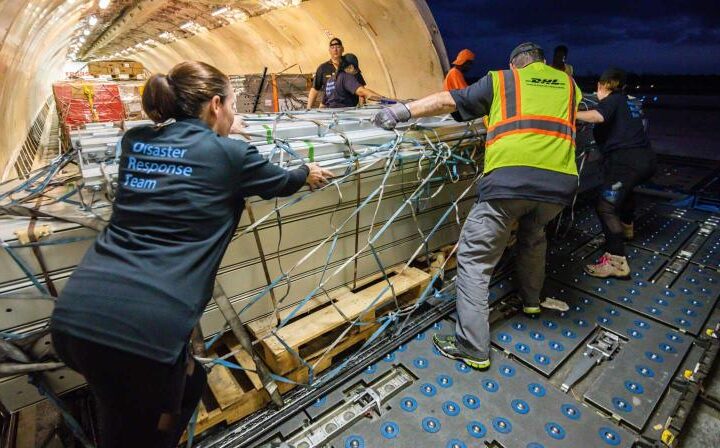Secretary of State Antony Blinken is headed to the Middle East for a series of visits aimed at easing the humanitarian crisis in Gaza, and is expected to raise the issue of a pause in fighting among other measures, U.S. officials said.
The U.S.’s chief diplomat will be visiting Israel on Friday for meetings with members of the Israeli government, followed by a stop in Jordan. Before he departed, he said he would discuss with Israeli officials “concrete steps that can and should be taken” to protect civilians in Gaza, as international concern grows over the intense fighting in the enclave and Israeli forces move to encircle Gaza City.
“This is something that the United States is committed to,” Blinken told reporters.
In addition, Blinken and his lieutenants are speaking with their counterparts in Arab states about plans for governing Gaza after Israel finishes its main military operations there, according to people familiar with the early-stage conversations.
“We need to be focusing on the day after,” he said. “And so in conversations that we’ll be having over the course of this weekend, I expect you’ll see a focus there and particularly how we can get, over time, to two states for two peoples.”
The Biden administration has for more than a week called for a “humanitarian pause” that would enable aid to flow into the besieged territory—and potentially facilitate the egress of foreign nationals and Palestinians injured in the fighting.

“I think we need a pause,” President Biden said on Wednesday night. Biden told the audience that he had persuaded Israeli Prime Minister Benjamin Netanyahu to agree to a temporary pause in October to arrange for the safe passage of two American hostages who were released by Hamas.
Netanyahu’s office declined to comment on a U.S. suggestion for a pause.
Israeli forces pushed across Gaza and in from the Mediterranean coast Thursday, cutting the enclave in two and isolating densely populated urban areas in the north, where armored and infantry units were battling Hamas militants, said the Israeli military and the United Nations.
“IDF forces have finished encircling Gaza City, the stronghold of the Hamas terrorist organization,” said an Israeli military spokesman, Rear Adm. Daniel Hagari, on Thursday night.
Israel said 20 soldiers have been killed in Gaza and elsewhere since the start of ground operations in the enclave. The Hamas-controlled Gaza health authorities said more than 9,000 people had been killed, most of them women and children. The figures don’t distinguish between militants and civilians.
More than 340 foreigners, including 74 U.S. citizens, crossed into Egypt from Gaza on Thursday. The Americans are among a second group of foreign nationals who were trying to exit Gaza through the Rafah border crossing to Egypt, a day after a previous group of more than 400 people, including many Palestinians with dual citizenship, were able to leave.
It has been a frustrating wait. The Americans in Gaza are grappling with a lack of verified information about who is allowed to cross into Egypt. In most cases, foreign nationals who are evacuating are leaving behind relatives who don’t have a second passport to face an uncertain future in Gaza. Now, some families made up entirely of American citizens are also being forced to separate, as not all of them have been cleared to leave together.
An American, Zaena Shaath, has been sheltering with her family in Rafah city, a short drive from the border. She, her father, her brother and her sister are all U.S. citizens, but when the list of names for those cleared to cross into Egypt on Thursday was published by the Palestinian border authorities, only her 63-year-old father’s name was included.
Shaath said her father wasn’t going to leave Gaza without his children. The U.S. Embassy in Israel later found her name on another list, she said, but her siblings’ status remains unclear.

“We either leave as a package or not,” she said.
As they waited for an update from the U.S. Embassy, bombing began across the street from the home where they were sheltering. Shaath said she could hear people screaming in the street outside and an ambulance siren.
“We are sitting on the stairs in case we need to leave,” she said. “We don’t know if we are going to make it or not.”
U.S. officials have been negotiating for weeks with Egypt, Israel and Hamas through a back channel managed by Qatar to evacuate American citizens as the Israeli offensive intensifies. Israel launched its current assault on Gaza after an incursion by Hamas on Oct. 7 that Israeli officials say killed more than 1,400 people, mostly civilians. Palestinian militants abducted around 240 people on Oct. 7, including about 10 Americans.
A list of those scheduled to cross into Egypt on Thursday, published by the Palestinian border authority, included the names of around 400 Americans along with hundreds of others including citizens of Belgium, the Netherlands, Switzerland, Sri Lanka, Croatia, South Korea and Mexico.
Civilians gathered outside the terminal on the Palestinian side of the border from around 8 in the morning, waiting for border guards to call their names. By midafternoon, buses were seen crossing the checkpoint from the Gaza Strip, but it couldn’t immediately be determined how many people were on them or their nationalities.
Israeli ground operations have cut the northern Gaza Strip from the southern half of the territory, effectively encircling Gaza City and trapping hundreds of thousands of people inside, the U.N. humanitarian agency said in an update released early on Thursday local time.
Cutting off Gaza City and northern Gaza from the south would prevent the delivery of humanitarian aid, which has been trickling into the enclave from the southern border with Egypt, to people in the north, including 300,000 internally displaced people, the agency said.
Hagari, the Israeli military spokesman, said Wednesday that the Israel Defense Forces would maintain a safe passage for civilians in northern Gaza to move into the south, where Israeli officials have been urging them to seek refuge.
Some 1.4 million people, or more than half of the strip’s population, have fled their homes, according to the U.N., but many have chosen to remain in their homes in the north, fearing that they might not be allowed to return. Others are sheltering in U.N.-run schools and other buildings in the north.
Meanwhile, the uncertainty and long wait times at the Rafah border crossing with Egypt appear set to continue.
A Jordanian national, Fayzzeh al-Najjar, made it through Rafah on Wednesday night and was back home in Amman on Thursday. She had been visiting her daughter’s family when the conflict began, forcing her to join 60 extended relatives at her brother’s home as airstrikes landed all around.
“The buzzing sound is still ringing in my ears,” she said. “Thank God I am back, but I cannot get over the sound of the airplanes.”
Amed Khan, an American investor and philanthropist who runs private initiatives to get U.S. civilians out of other war zones, said Gaza presented the most challenging dynamics. “To this point, it’s a failure,” he said of U.S. efforts. “The fact that American citizens had to endure 25 days of intense, indiscriminate bombardment from F16s is unforgivable.”
Among them is Maha al-Banna, who moved back to Gaza from New Jersey to work with an aid organization. She took her nieces and nephews from northern Gaza to live in a house in the south with 48 people while her brother stayed behind with their disabled sister. She said they had problems securing food, water and fuel. A friend drove them to the border with the last bit of fuel they had.
“I still won’t believe it till I actually leave Gaza,” she said at the Rafah crossing, while border officials called people’s names one by one. “I’m going to be happy to be out and safe and with my kids but extremely worried about everybody else I know.”
“My heart is still here, all my family and my friends and my cousins and my nephews and nieces,” she said. “I’m torn, and I want them to be safe.”
Others might face a longer journey.
An American, Yousof Abu Shaban, an 18-year-old engineering student born in Michigan, suffered a severe shrapnel wound to his jaw when a bomb dropped on his family home in Gaza City on Oct. 18. His 14-year-old sister was killed, and his parents and younger sister were injured—they are all in a hospital in northern Gaza, unable to move without an ambulance, Abu Shaban said by phone.
Abu Shaban’s name was the only one from his family on the exit list Thursday, despite registering his relatives as dependents.
As the only U.S. citizen in his family, he said he is worried that if he leaves without them, they won’t be able to follow.
Anas Baba, Dov Lieber, Anat Peled and Suha Ma’ayeh contributed to this article.
Write to Jared Malsin at jared.malsin@wsj.com and Stephen Kalin at stephen.kalin@wsj.com




